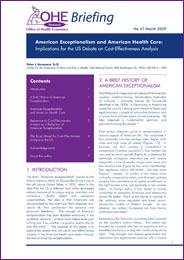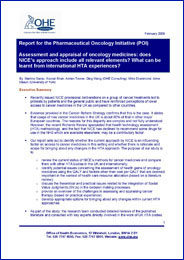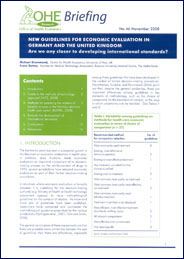Sign up to our newsletter Subscribe
American Exceptionalism and American Health Care: Implications for the US Debate on Cost-Effectiveness Analysis

Sign up to our newsletter Subscribe



The Office of Health Economics has recently widened its scope to take a special interest in the health care problems of the Poor World, with particular reference to. the role of medicines.
As a contribution to the discussion in this area, OHE is publishing this paper, which was delivered by Dr Arnold Warlock of The Wellcome Foundation Ltd at the 11th Assembly of the International Federation of Pharmaceutical Manufacturers’ Associations in Washington in June 1982.
In its Tables, the paper contains important data on the extent of some of the European pharmaceutical companies’ activities in the Developing Countries. It also gives a glimpse of other ways in which the pharmaceutical industry in Europe has contributed to the transfer of technology to the poor nations.
Hence this publication underlines two facts. The first is that the industry has made a significant contribution to employment and to the production of pharmaceuticals in the developing world. The second is that much more detailed analysis of the whole international pharmaceutical industry’s activities in the poor countries is badly needed.
Two decades ago, when the Office of Health Economics was first set up by the Association of the British Pharmaceutical Industry, a similar situation existed in Britain. The activities of the pharmaceutical industry in this country were shrouded in mystery, and this provided great scope for largely ill-informed criticism. This situation has now been corrected by better information and by the elimination of justifiable causes of criticism. The contribution of the pharmaceutical industry to the economy and health of Britain is no longer seriously questioned. It is to be ·hoped that the publication of progressively more solid data on the activities of the industry in the Poor World, together with improvements in its standards of marketing practice, will soon reveal the nature of its benefits there too.
An error has occurred, please try again later.
This website uses cookies so that we can provide you with the best user experience possible. Cookie information is stored in your browser and performs functions such as recognising you when you return to our website and helping our team to understand which sections of the website you find most interesting and useful.
Strictly Necessary Cookie should be enabled at all times so that we can save your preferences for cookie settings.
If you disable this cookie, we will not be able to save your preferences. This means that every time you visit this website you will need to enable or disable cookies again.
This website uses Google Analytics to collect anonymous information such as the number of visitors to the site, and the most popular pages.
Keeping this cookie enabled helps us to improve our website.
Please enable Strictly Necessary Cookies first so that we can save your preferences!